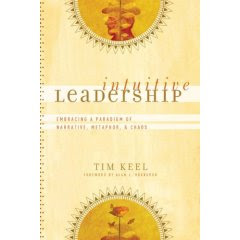Intuitive Leadership Series

Today I finished probably the best book I've read in over a year, Intuitive Leadership by Tim Keel. It is a book rich with metaphor, story and insight into church leadership in our changing context. I am still not sure I have adequately taken in all that this work has to offer, and so to that end, I begin a series on this book. I'm not sure how many posts it will cover, but I plan to work my way through this book again, slowly and intentionally, highlighting important themes, ideas, and implications. As a way of introduction, let me offer one general insight.
It bears noting that Keel does not seek to offer a leadership manual for the Emergent church, or postmodern context. This is crucial for in so doing he offers, in large measure, an implicit ecclesiology that is deeply conversant with sociological, cultural, and scientific research; a truly interdisciplinary based theology of leadership. Throughout, I remarked in the margins how at the core of Keel's analysis and proposal was an unspoken question of ecclesial identity: who are we church?
This may seem somewhat passe, yet the incredibly rich context of Keel's own church, Jacob's Well in Kansas City, enlivens what on the surface could appear to be a somewhat mundane question. To be fair, Keel never directly asks this, but my read is that this question is constantly hovering in the background. And because his ideas are embedded in his own local context, Keel calls forth fruitful possibilities and genuinely new horizons for the church and her leadership. All throughout I continually found myself asking how this would play out in my own context, precisely because I was invited into Keel's. This put flesh on the question of identity, and forced me to consider how leadership ought always to be attendant to this question.
For the systematicians there is probably a prior question, I'm sure (Christological in nature...never fear Barth still casts a long shadow over my thinking). Yet, it is with this basic ecclesiological question that I wanted to begin as I look forward to unpacking this book more thoroughly. If you have not read it, please pick up a copy. I'd love to hear your thoughts as I wade through it.
